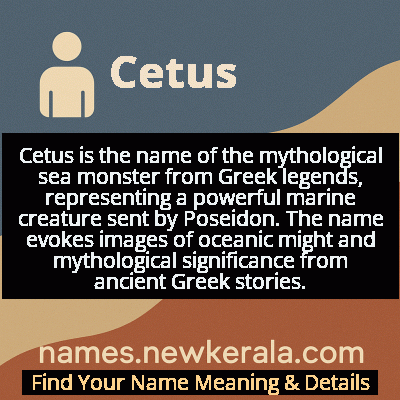Cetus Name Meaning & Details
Origin, Popularity, Numerology Analysis & Name Meaning of Cetus
Discover the origin, meaning, and cultural significance of the name CETUS. Delve into its historical roots and explore the lasting impact it has had on communities and traditions.
Name
Cetus
Gender
Male
Origin
Greek
Lucky Number
5
Meaning of the Name - Cetus
Cetus is the name of the mythological sea monster from Greek legends, representing a powerful marine creature sent by Poseidon. The name evokes images of oceanic might and mythological significance from ancient Greek stories.
Cetus - Complete Numerology Analysis
Your Numerology Number
Based on Pythagorean Numerology System
Ruling Planet
Mercury
Positive Nature
Adventurous, dynamic, curious, and social.
Negative Traits
Restless, impatient, inconsistent, prone to indulgence.
Lucky Colours
Green, white.
Lucky Days
Wednesday.
Lucky Stones
Emerald.
Harmony Numbers
1, 3, 9.
Best Suited Professions
Sales, marketing, travel, entertainment.
What People Like About You
Versatility, charisma, adventurous spirit.
Famous People Named Cetus
Cetus of Mythology
Mythological Figure
The sea monster sent by Poseidon to devour Andromeda, slain by Perseus
Cetus Astronomer
Astronomical Constellation
Represents the sea monster in the night sky, one of Ptolemy's original 48 constellations
Cetus Marine Biologist
Scientific Reference
Name used in scientific classification for marine species and research vessels
Name Variations & International Equivalents
Click on blue names to explore their detailed meanings. Gray names with will be available soon.
Cultural & Historical Significance
Beyond mythology, Cetus has astronomical importance as one of the largest constellations in the night sky, cataloged by Ptolemy in the 2nd century and representing the sea monster in celestial form. The constellation's position in the water-related region of the sky near other aquatic constellations reinforces its maritime symbolism. In modern times, Cetus continues to influence scientific nomenclature, particularly in marine biology and astronomy, serving as a bridge between ancient mythological traditions and contemporary scientific exploration.
Extended Personality Analysis
Individuals named Cetus are often perceived as possessing deep, mysterious qualities reminiscent of the ocean depths. They tend to be powerful personalities with strong convictions and an imposing presence that commands respect. Like the mythological sea monster, they may exhibit protective instincts toward those they care about, capable of fierce loyalty and defense of their 'domain' or loved ones. There's often an element of unpredictability in their nature—calm and measured in normal circumstances but capable of explosive energy when provoked or when defending their principles.
Despite their potentially intimidating exterior, those named Cetus typically harbor profound depth and complexity. They often possess ancient wisdom or unconventional perspectives that set them apart from others. Their connection to water symbolism suggests emotional depth, intuition, and the ability to navigate turbulent situations with grace. They may struggle with being misunderstood due to their intense nature but ultimately represent the balance between destructive potential and protective strength, much like the sea itself—both life-giving and dangerous depending on circumstance.
Modern Usage & Popularity
In contemporary usage, Cetus remains an exceptionally rare given name, primarily employed by parents with strong interests in classical mythology, astronomy, or unique mythological names. Its usage is almost exclusively masculine and tends to appeal to those seeking a name with profound mythological roots and distinctive character. While not appearing on popular baby name charts, Cetus has seen a slight increase in usage among academic families and those in scientific fields, particularly astronomy and marine biology. The name's association with the constellation ensures its continued relevance in astronomical contexts, and it occasionally appears in fantasy literature and gaming communities as a character name representing power and mystery.
Symbolic & Spiritual Meanings
Cetus symbolizes the untamed power of nature, particularly the destructive yet life-sustaining force of the ocean. It represents the boundary between known and unknown realms—the threshold where human civilization meets primordial chaos. Metaphorically, Cetus embodies the challenges and monsters we must face to achieve growth and transformation, much like Perseus confronting the beast to save Andromeda. The creature also symbolizes the consequences of pride and the necessity of humility before natural forces greater than humanity. In psychological terms, Cetus can represent the shadow self or unconscious depths that must be integrated rather than defeated, suggesting that what appears monstrous may contain hidden wisdom or necessary aspects of wholeness.

